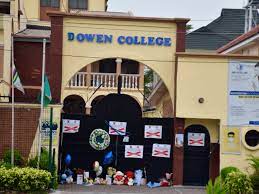Editorial
Dowen: Let Justice Reign

The unfortunate end of Master Sylvester Oromoni (Jnr) has sparked off another round of social outrage, with widespread demands for justice. The death of Oromoni, a Junior Secondary School (JSS 2) student of Dowen College, Lekki, Lagos, has brought to prominence the heightening culture of violence, bullying and hate crimes in the nation’s school system.
The 11-year-old Oromoni had reported threats to his life by senior students who compelled him to join their cult to the school authorities. Failure by the school to immediately treat the matter with the urgency it required gave room for Oromoni to be attacked in his dormitory on November 27, 2021. Initially, the school authorities claimed that the late student sustained injuries while playing football.
A video of the child writhing in pain on his death bed with obvious injuries to his mouth, legs and belly went viral. The school claimed he had been treated in its clinic before his parents were called to take him home for further treatment. Meanwhile, about 180,000 petitions have been submitted to the police demanding for justice. The Lagos State Government has sealed the college and taken keen interest in the matter.
It is sad that children of that young age would be exposed to cultism with the school doing nothing to nip it in the bud. There are reports that some schools, especially expensive private ones, regularly pander to the whims of students and their wealthy and highly-connected parents to the detriment of other students and staff. This is the typical malaise of the private school syndrome which has taken over our education system.
This incident has further exposed the shortcomings of some highbrow schools. Regrettably, although some of the fees are expensive, the safety of students cannot be guaranteed. Although Oromoni’s death caused national outrage and condemnation, many parents have threatened to let their children drop out of the school.
Following the painful incident, the police arrested five students who were named by late Sylvester before his death, while an investigation is still ongoing. The affected students have been remanded in a juvenile home. The police should unravel the circumstances of his death and bring to justice the killers of the young lad.
According to sources, the late student was allegedly brutalised by the arrested five students for his refusal to join a cult group in the school. President Muhammadu Buhari has condemned the dastardly act and said that anyone found guilty in the death of Sylvester would be made to face the full wrath of the law. We agree no less with the President. Everyone must all ensure that there is justice for the late student.
Similarly, the House of Representatives has directed the Inspector-General of Police, Usman Akali, to take over the investigation into the death of Sylvester Oromoni Jnr. It also asked its Committees on Education, Youth Development, Women Affairs and Social Development and Safety to conduct an investigation into the matter and report back to it. This is commendable as it will make certain there is no place to hide for the school authorities and the killers.
It is depressing and saddens our heart to see another future leader of our dear nation killed for his refusal to join a cult group in school. We laud the Lagos State governor, Babajide Sanwo-Olu, for his action in reacting to the call by the masses and subsequently shutting the school to further investigate the matter. Dowen College must be held accountable for failing to protect the life of a child in its custody.
Besides characterising the rising violence in society, the Dowen incident can be traced to soaring indiscipline in secondary schools and poor supervision in some private schools. We condemn the growing culture of bullying in our country’s secondary schools, especially boarding schools. School authorities must rise to the challenge and ensure that discipline is restored in the schools. They must guarantee the safety of all students.
At the same time, we urge parents to pay close attention to their children, to know when they are being bullied or maltreated in school. Bullying and corporal punishment must be banned in schools. All schools, both public and private, should come up with pragmatic policies against bullying. And let there be enough stringent sanctions against it.
Sylvester Oromoni (Jnr) must not die in vain. We call on all petitioners to assiduously follow up their petitions until justice is done. Without pressing home these petitions, this tragedy will be quickly forgotten just like others before it. We look forward to the day when competent leaders will arise and restore sanity in our public school system.
This incident should be seen as an inflexion point for all schools in the country – private and public. A lot has gone wrong even in primary schools. Time was when cult groups were the exclusive preserve of the universities. Not anymore! Today, even primary school pupils have been initiated into cults, a vice they cultivated from their parents and other adult members of society.
Editorial
Resolve Rumuwoji Market Issues, Others

Editorial
As NDG Ends Season 2

Editorial
Beginning A New Dawn At RSNC

-

 News4 days ago
News4 days agoAmend Constitution To Accommodate State Police, Tinubu Tells Senators
-

 Politics4 days ago
Politics4 days agoSenate Urges Tinubu To Sack CAC Boss
-
Business4 days ago
Crisis Response: EU-project Delivers New Vet. Clinic To Katsina Govt.
-
Business4 days ago
President Tinubu Approves Extension Ban On Raw Shea Nut Export
-

 News4 days ago
News4 days agoDisu Takes Over As New IGP …Declares Total War On Corruption, Impunity
-
Business4 days ago
Fidelity Bank To Empower Women With Sustainable Entrepreneurship Skills, HAP2.0
-
Business4 days ago
President Tinubu Extends Raw Shea Nuts Export Ban To 2027
-
Sports4 days ago
NDG: Rivers Coach Appeal To NDDC In Talent Discovery

